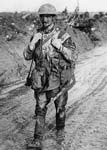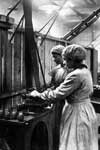Women’s Voices from the Scottish Borders
November 16, 2015 by User deactivated | 0 comments
Remembering domestic servants, shorthand typists, cinema pianists and suffragettes: new soundbites from the Ian Landles Oral History Archive
We’re releasing some more soundbites from the Ian Landles Oral History Archive this week. This time we’re showcasing the stories of women from the Scottish Borders.
You’ll hear from Mrs Oliver (b.1901) about her experiences as a pianist working in cinemas in Hawick – ‘The Piv’ and ‘The Wee Thee’ – providing the soundtrack for silent movies. Mrs Oliver also worked as a shorthand typist and she talks about this in a second soundbite. We learn how she perfected her shorthand by sitting in the back of church during services and noting down the sermons.
Other women talk about their memories of the suffrage movement in the years leading up to the First World War. Mrs Stewart (b.1881) remembers suffragettes coming to Hawick and Mrs Thomson tells us how the activists gained a reputation amongst the locals: ‘they come to burn hooses doon’.
- Cinema
- Shorthand Typists
- Domestic Servants
- Suffragettes
A number of women in the Borders worked in service in the early 20th century at the many country houses and estates across the region. Catherine McLeish (b.1902) and Meg Wilson (b.1893) share their experiences.
Follow us on Twitter and watch our Twitterfeed from tomorrow to catch these soundbites.
The Ian Landles Archive is a series of interviews and sound recordings collected by local historian Ian Landles between the 1960s and 2010. The collection, originally started in order to preserve the memories of local men who had fought in World War One, also contains testimonies from local women and material on The Hawick Common Riding, poetry, music, the railways, farming life and mill life. The original full interviews are held on audio cassette tape by Scottish Borders Council Archive Services at the Heritage Hub in Hawick. To listen to all interviews from the Ian Landles Archive currently held on Scran click here.
Images © Aberdeen City Council, Hulton Getty, Dalmellington & District Conservation Trust | Licensor Scran













